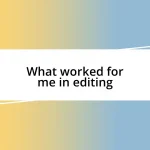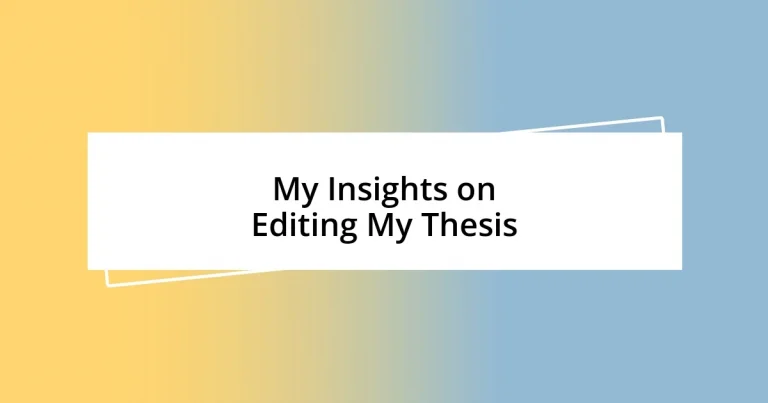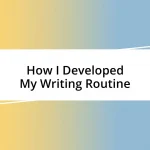Key takeaways:
- Editing enhances clarity and argument strength, transforming the thesis into a more compelling narrative while eliminating irrelevant information.
- Creating a structured and flexible editing schedule allows for manageable progress and prevents burnout, promoting focused and effective revisions.
- Seeking peer feedback and utilizing editing tools enriches the editing process, offering new perspectives and enhancing the overall quality of the thesis.
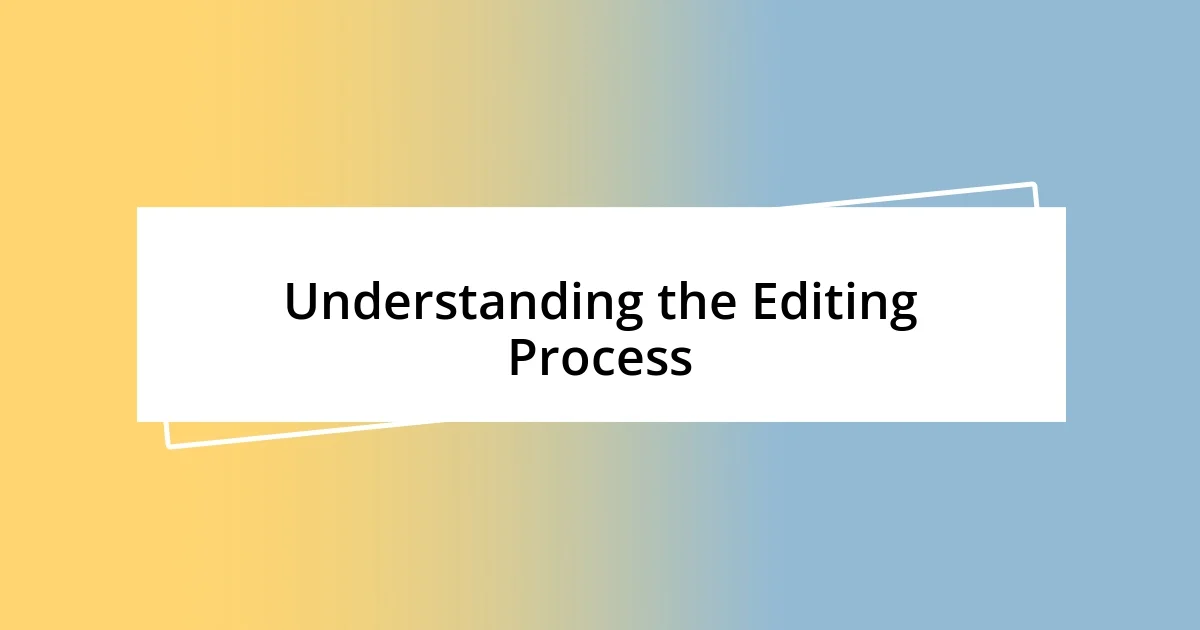
Understanding the Editing Process
Understanding the editing process is like peeling back the layers of an onion. Each time I revisited my thesis, it felt as if new ideas emerged while some existing ones needed to be discarded. Have you ever experienced that “aha!” moment when the right word finally clicks into place?
One thing I learned was that editing isn’t just about correcting grammar or punctuation; it’s about refining the argument. I remember one draft where I had included numerous references, but as I read it over, I realized many were irrelevant. This prompted the realization that clarity should always take precedence over quantity. How much stronger does a tightly woven narrative feel compared to one cluttered with unnecessary frills?
Moreover, breaking the editing process into stages helped me maintain focus and reduce overwhelm. I’d first tackle the structural edits, stepping back to examine the flow of ideas, then shift into line edits where I polished sentences. It was a relief to see progress in such small steps. Have you found that these manageable tasks make a significant difference in your editing efficiency?
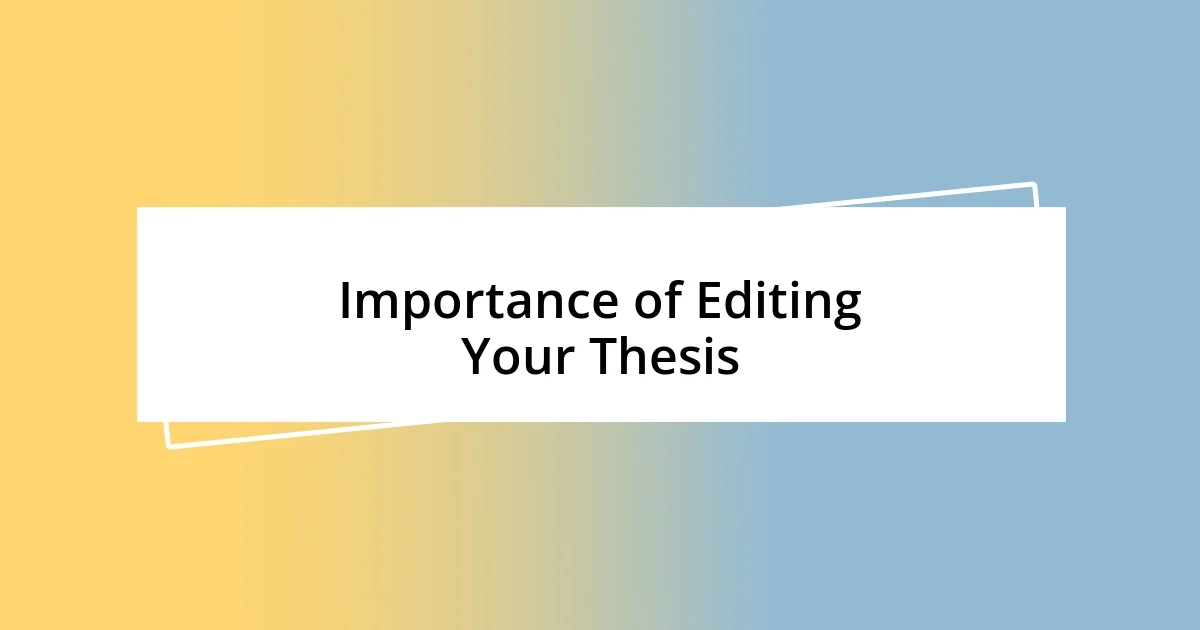
Importance of Editing Your Thesis
The importance of editing my thesis became increasingly clear as I progressed through my writing journey. Initially, I underestimated how much clarity and coherence editing could bring, but with each revision, it felt like piecing together a puzzle. I vividly remember completely restructuring a section that I thought was solid, only to find that it transformed the entire argument into something more compelling.
Here are some reasons why editing your thesis is crucial:
- Enhances Clarity: A polished thesis communicates ideas more effectively, making it easier for readers to follow your argument.
- Strengthens Arguments: It allows you to refine your conclusions and eliminate weak or irrelevant information that could dilute your main points.
- Boosts Credibility: Thorough editing can prevent errors that might undermine the professionalism of your work.
- Increases Engagement: A well-edited thesis keeps readers interested and helps maintain their attention.
- Fosters Confidence: Knowing that your work is clear and well-argued gives you a sense of pride and builds your confidence when presenting your findings.
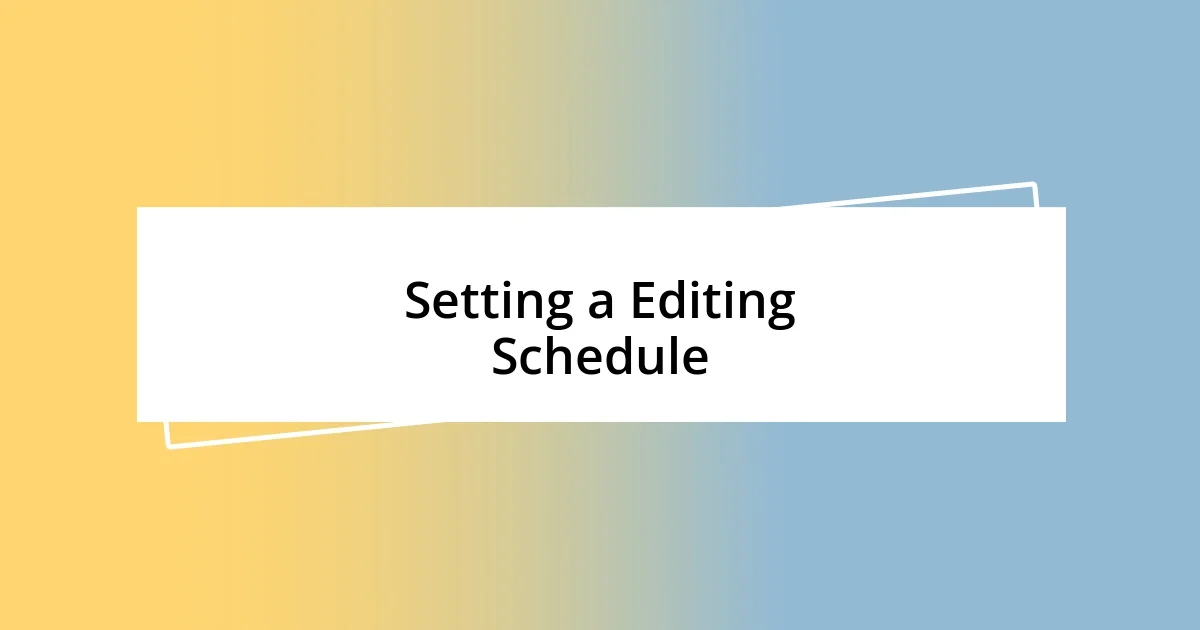
Setting a Editing Schedule
Setting an editing schedule transformed the daunting task of refining my thesis into a manageable and effective process. I remember the first time I plotted out my editing days on a calendar; it felt like a small victory, as I could see my progress laid out clearly. Allocating specific blocks of time dedicated to editing not only helped me stay organized but also allowed me to approach each session with purpose and focus.
Creating a schedule also helped in setting realistic expectations. I found myself more productive when I broke down the editing into distinct phases, such as content review, structural edits, and then fine-tuning grammar and punctuation. It was during one of these structured sessions that I discovered a critical flaw in my argument—one I might have missed without a dedicated editing phase. Have you ever felt that kind of clarity when you focus solely on one aspect of your work?
One key element that I learned is to be flexible with my schedule. There were days when I was frazzled and couldn’t give my thesis the attention it needed. Allowing myself some grace and shifting my editing blocks helped me avoid burnout. I remember skipping a session to take a walk, returning refreshed and having new insights that improved my work significantly.
| Editing Schedule Type | Details |
|---|---|
| Structured Sessions | Set specific days and times for focused editing tasks. |
| Flexible Blocks | Allow adjustments based on your workload and emotional state. |
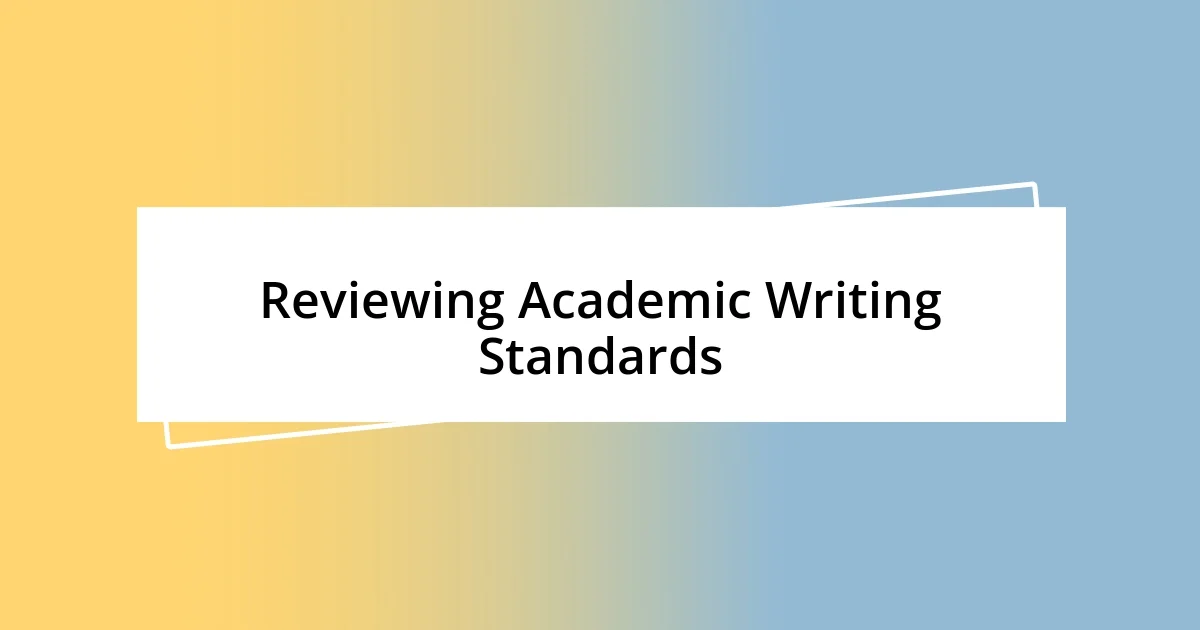
Reviewing Academic Writing Standards
As I delved into the nuances of academic writing standards, I realized how crucial it is to adhere to specific guidelines. Each institution often has its own preferred style—be it APA, MLA, or Chicago—and I found that my adherence to these standards not only streamlined my writing but also lent credence to my work. Have you ever noticed how a well-formatted reference section can enhance your thesis’s professionalism? It’s these seemingly small details that leave a lasting impression.
In my experience, reviewing academic writing standards involves much more than just checking for consistency in citations; it’s about ensuring clarity and precision in language. There were moments when I needed to simplify complex ideas to make them accessible. I remember going through a particularly dense paragraph and realizing it could be chopped down into a couple of straightforward sentences. This transformation not only improved the readability but also helped my audience grasp my argument more effectively. Have you ever faced that same struggle between complexity and simplicity in your writing?
Moreover, engaging with academic standards pushed me to refine my voice while maintaining a formal tone. I had to discover the balance—the line between sounding authoritative and relatable. On one occasion, I felt that my thesis was too dry, so I integrated a personal anecdote related to my research. Striking this harmony not only enriched my thesis but also kept my readers engaged. It’s vital to remember: academic writing can be both rigorous and relatable!
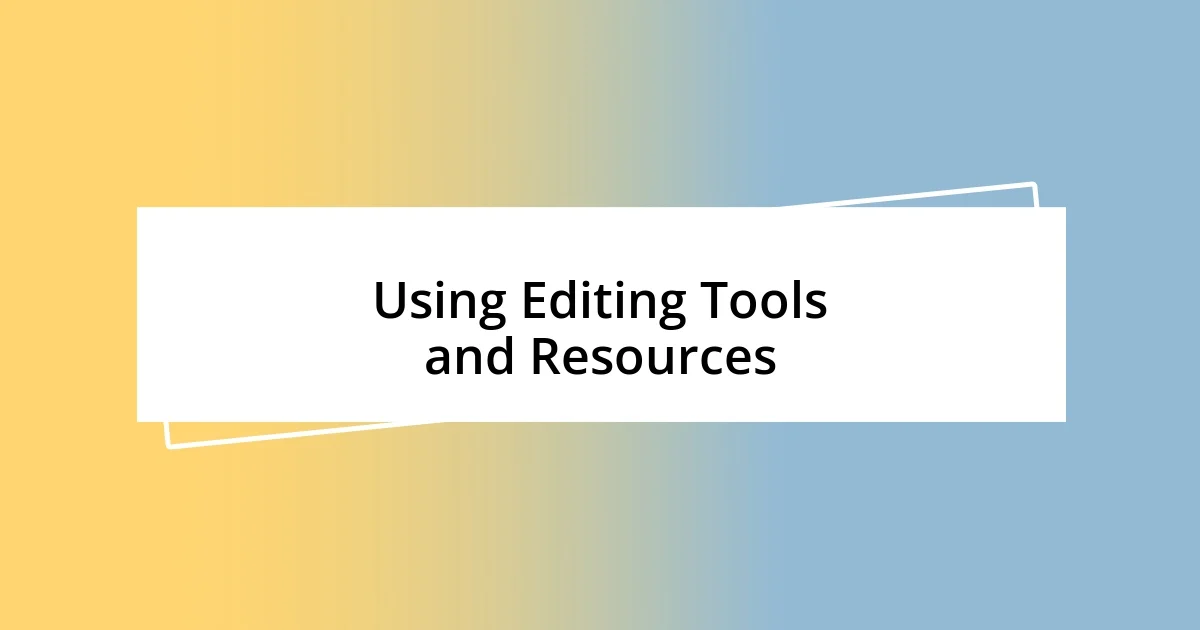
Using Editing Tools and Resources
Using editing tools and resources can be a game changer in the thesis editing process. I vividly remember the relief I felt when I discovered software like Grammarly and Hemingway; these tools helped me pinpoint grammar issues and highlighted overly complex sentences. It’s fascinating how technology can step in and enhance our writing by flagging areas that need clarity. Have you ever used an editing tool and been surprised by how many unnoticed errors it found?
In addition to grammar checkers, I found incorporating resources like citation managers incredibly beneficial. Programs like Zotero not only helped me organize my references but also ensured that my citations were formatted correctly. The smoothness of inserting citations as I went along made the editing process less stressful. I initially dreaded the thought of manually sifting through my references but realized that using such tools not only saved time but also offered a new level of confidence in my work. Do you ever feel overwhelmed by managing citations while writing?
Also, don’t overlook the power of collaborative tools. I began sharing my thesis with peers using Google Docs for real-time feedback, and it was an enlightening experience. I was surprised by how they caught nuances in my argument that I had missed entirely. It was one of those “lightbulb moments” when I realized that outside perspectives could refine my work significantly. Have you ever experienced a revelation during a peer review process that changed your approach?

Seeking Feedback from Peers
Sharing my thesis with peers was one of the best decisions I made during my editing process. I remember one specific instance when my friend pointed out a section that seemed confusing, despite my belief that it was crystal clear. It was a tough moment—but also a light bulb moment! I realized that my understanding of the topic didn’t necessarily translate into clarity for someone else. Have you ever felt so close to your work that you couldn’t see the areas that needed improvement?
Beyond just catching errors, feedback from peers opened my eyes to fresh perspectives. I had a peer who suggested restructuring an entire chapter to enhance the flow of ideas. At first, I hesitated, thinking that my original structure was solid. However, once I took a step back and considered their feedback, I was amazed at how much more coherent my argument became. It’s intriguing how a different viewpoint can shed light on aspects you might have overlooked. Have you found that others can see what you can’t when it comes to your writing?
I also learned the emotional value of seeking feedback. It creates a sense of community and support, especially during the often-isolating journey of thesis writing. I recall sitting down with a few friends in a café, passing around drafts, and exchanging thoughts. It was not just about editing; it felt like we were collectively contributing to each other’s success. How can you underestimate the motivation that comes from knowing your peers are invested in your work? This experience reinforced the idea that collaboration is a powerful ally in the quest for academic excellence.
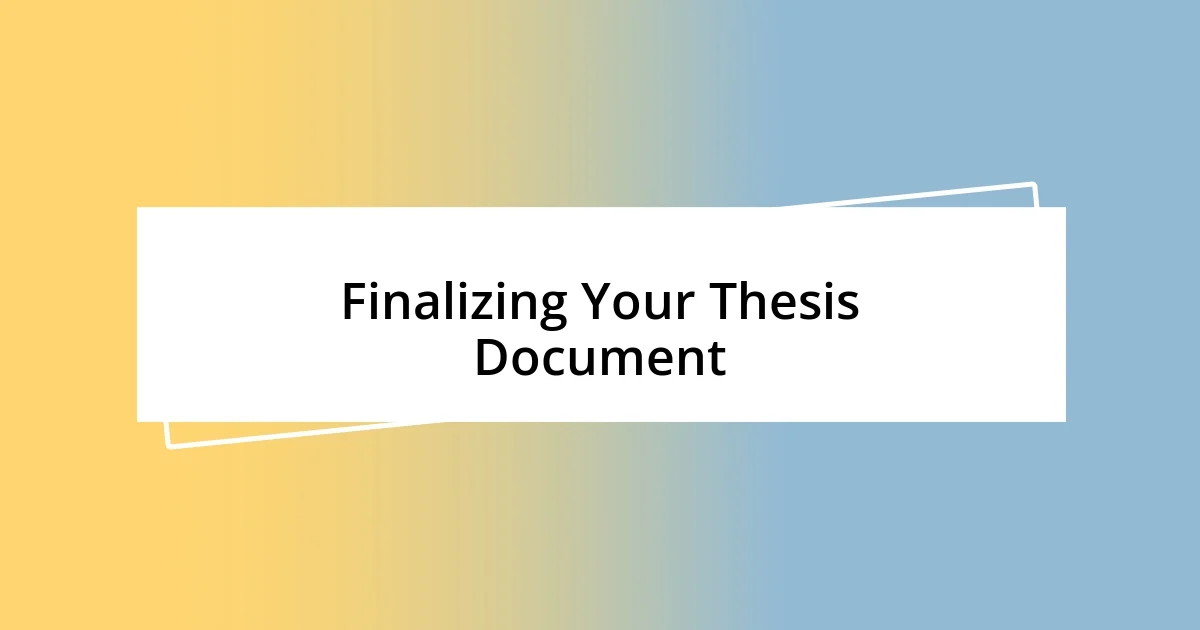
Finalizing Your Thesis Document
Finalizing my thesis document was both exhilarating and nerve-wracking. There came a moment when I realized I had to literally let go of my work and declare it “done.” It felt like standing at the edge of a diving board, knowing I had prepared, but still hesitating. Have you ever faced that moment when perfectionism clashes with the need to finish?
I found that creating a checklist helped streamline the final stages of my submission. I included everything from checking formatting guidelines to ensuring all my references were in order. I distinctly remember the relief that washed over me when I ticked off the last item on my list. It allowed me to see my work in a new light, almost like closing a chapter in a book. How often do we overlook the little details that matter most in our rush to complete a project?
As I prepared to submit my thesis, I also took the time to reflect on my journey. It was intriguing to think about how much my work evolved and how I had grown as a scholar. I made an effort to print out my final draft—holding a physical copy in my hands felt significant. It symbolized not just the culmination of my hard work, but also the countless hours of research and writing. Have you ever paused to appreciate the path you’ve taken, even when the finish line seems in sight?



